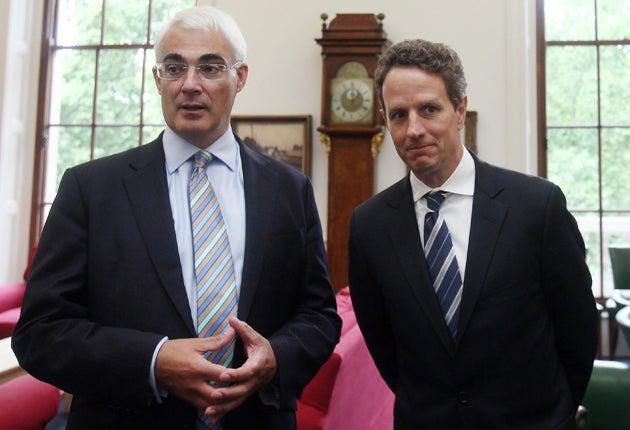Britain and US frustrate global deal on bonus cap
Opponents of pay policy say attempt to limit bankers' income would be unworkable

Your support helps us to tell the story
From reproductive rights to climate change to Big Tech, The Independent is on the ground when the story is developing. Whether it's investigating the financials of Elon Musk's pro-Trump PAC or producing our latest documentary, 'The A Word', which shines a light on the American women fighting for reproductive rights, we know how important it is to parse out the facts from the messaging.
At such a critical moment in US history, we need reporters on the ground. Your donation allows us to keep sending journalists to speak to both sides of the story.
The Independent is trusted by Americans across the entire political spectrum. And unlike many other quality news outlets, we choose not to lock Americans out of our reporting and analysis with paywalls. We believe quality journalism should be available to everyone, paid for by those who can afford it.
Your support makes all the difference.Attempts to clamp down on bankers' bonuses to prevent another global financial crisis were in disarray last night as Britain and America opposed proposals by other European Union nations.
Alistair Darling, the Chancellor, admitted that G20 finance ministers were so divided that they were unlikely to reach a detailed agreement on bonuses at their meeting in London, which began last night and concludes today. He expected that "further work" would be needed before G20 leaders gather in Pittsburgh on 24 September.
France led calls for a cap on individual bonuses but Britain and America, while backing common rules to prevent excessive bonuses, argued that a "pay policy" would be unworkable. They suspect that bankers would find loopholes such as incorporating bonuses into pay.
Christine Lagarde, the French finance minister, said: "They [bankers] are active participants in the economy but they are not above the rules and they should have a real interest in making sure that what we went through (the crisis) does not happen again. As far as governments are concerned, their responsibility is not to the City. It is to the public."
Seven EU countries led by Sweden, which holds the EU's rotating presidency, urged the G20 to take tough action on "dangerous, indecent, cynical and unacceptable" rewards for bankers. They want a ban on bonuses guaranteed for more than a year, arguing that bonuses should instead be paid out over a number of years and should "mirror the individual's and the bank's actual performance over time".
The plan was also backed by France, Germany, Italy, Spain, Luxembourg and the Netherlands. Sweden will increase the pressure on Britain to move towards the Europeans' stance by calling a special meeting of EU leaders a week before the Pittsburgh summit.
Hopes of a deal on bonuses appeared to rise on Thursday when Gordon Brown, the French President Nicolas Sarkozy and the German Chancellor Angela Merkel put their names to a joint letter calling for binding rules. But as the finance ministers' talks got underway, it was clear that there was little agreement on the detail – and that Britain would join the US in opposing a cap.
Mr Darling dismissed the French proposal and said of the various plans on the table: "We are ready to work with other countries but what are really focused on in this country are practical proposals that actually strike at the behaviour we would like to stop and encourage long term commitment and growth."
After talks with the US Treasury Secretary Timothy Geithner, Mr Darling made clear they wanted to link bankers' pay to long-term performance but without formal ceilings on bonuses. He said: "The United States would take the same view as we do – if you cap a bonus, all the individual needs to do is either jack up their basic salary or get paid in some other way."
However, there were signs that the G20 finance ministers would set aside their differences over how long to maintain the fiscal stimulus packages they have introduced to combat the recession.
Germany and France, which have started to return to growth, are keener to wind down their extra spending than Britain and the US. But agreement was expected today on a statement saying that it was too early to take recovery for granted and that "exit strategies" should be co-ordinated.
George Osborne, the shadow Chancellor, said: "Instead of international co-operation on bonuses we have domestic confusion. Yesterday Gordon Brown signed a letter promising to explore bonus caps, and today Alistair Darling says those caps are unworkable."
Brown vs Cameron: The view from Obama's camp
*When Barack Obama left David Cameron's Commons office last summer, 25 Tory aides lined up outside and applauded the presidential candidate. To their delight, he shook hands with them all.
Ever since Mr Obama's trip to Britain in July last year, allies of Mr Cameron and Gordon Brown have been spinning that their man is the one who enjoys the special relationship with the US President.
Now evidence has emerged that he was more impressed with Mr Cameron than Mr Brown. In a book by British-born journalist Richard Woolfe, Renegade, The Making of Barack Obama, the writer claims that Mr Obama bonded with the Tory leader and found Mr Brown dreary. "He and his aides thought [Cameron] had energy and verve ... There was a bonding ... which you would not have expected from two people at opposite ends of the political spectrum." Whereas Mr Brown, Woolfe said on BBC Radio 4, "they found very lacklustre". However, Mr Obama told the journalist that he had great respect for the Prime Minister and appreciated his policy expertise, particularly on finance and economics.
Join our commenting forum
Join thought-provoking conversations, follow other Independent readers and see their replies
Comments